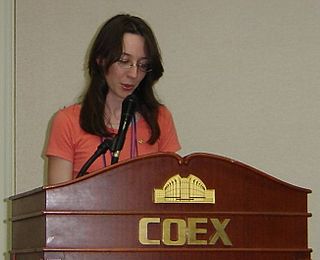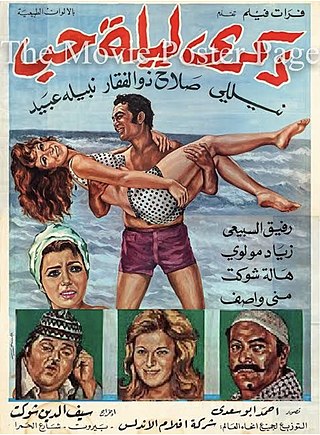
William Garfield Greaves was an American documentary filmmaker and a pioneer of film-making. After trying his hand at acting, he became a filmmaker who produced more than two hundred documentary films, and wrote and directed more than half of these. Greaves garnered many accolades for his work, including four Emmy nominations.

Citizen media is content produced by private citizens who are not professional journalists. Citizen journalism, participatory media and democratic media are related principles.
The Prince Claus Fund was established in 1996, named in honor of Prince Claus of the Netherlands. It receives an annual subsidy from the Dutch Ministry of Foreign Affairs.
Middle Eastern cinema collectively refers to the film industries of West Asia and part of North Africa. By definition, it encompasses the film industries of Egypt, Iran, Bahrain, Iraq, Israel, Jordan, Kuwait, Lebanon, Palestine, Oman, Qatar, Saudi Arabia, Syria, United Arab Emirates, and Yemen. As such, the film industries of these countries are also part of the cinema of Asia, or in the case of Egypt, Africa.
Participatory video (PV) is a form of participatory media in which a group or community creates their own film. The idea behind this is that making a video is easy and accessible, and is a great way of bringing people together to explore issues, voice concerns or simply to be creative and tell stories. It is therefore primarily about process, though high quality and accessible films (products) can be created using these methods if that is a desired outcome. This process can be very empowering, enabling a group or community to take their own action to solve their own problems, and also to communicate their needs and ideas to decision-makers and/or other groups and communities. As such, PV can be a highly effective tool to engage and mobilise marginalised people, and to help them to implement their own forms of sustainable development based on local needs.

Visual Communications –– is a community-based non-profit media arts organization based in Los Angeles. It was founded in 1970 by independent filmmakers Robert Nakamura, Alan Ohashi, Eddie Wong, and Duane Kubo, who were students of EthnoCommunications, an alternative film school at University of California, Los Angeles. The mission of VC is to "promote intercultural understanding through the creation, presentation, preservation and support of media works by and about Asian Pacific Americans."
City Lore: the New York Center for Urban Culture was founded in 1986 and was the first organization in the United States devoted expressly to the "documentation, preservation, and presentation of urban folk culture." Their mission is to produce programs and publications that convey the richness of New York City—and America's—living cultural heritage. In addition to regular programming that includes the Place Matters Awards and the People's Hall of Fame, the organization works with a wide range of partners to develop exhibitions, publications, and documentary films, and to advocate for the rights of street performers, ethnic clubs, and other grassroots cultural expressions in New York City. City Lore works in four cultural domains: urban folklore and history, preservation, arts in education, and grassroots poetry traditions. Described by Sonnet Takahisa of the September 11th Memorial Museum as "wise renegades," their programs include People's Poetry Project, Place Matters and City of Memory.

Syrian cinema has existed since the early 20th century. The first Syrian film was Al Muttaham al Baree , released in 1928. Since the early 1960s, the film sector has been mainly managed by the National Organization for Cinema, a department of Ministry of Culture. The film industry blossomed in the 1960s, despite a significant shift toward nationalistic documentaries, and has continued to garner attention. Prominent filmmakers include Nazih Shabandar, Rasheed Jalal, and Qays al-Zubeydi.

Jian Yi is a Chinese independent filmmaker, social innovator and food activist who currently conducts research at the Animal Law and Policy Program at the Harvard Law School since 2022. His films Bamboo Shoots and Super, Girls! won a number of international film festival awards. Jian Yi co-founded the ground-breaking China Villager Documentary Project with filmmaker Wu Wenguang in 2004, and founded the IFChina Original Studio in 2008. His works have been shown at numerous film festivals, museums and university campuses across the globe. Jian Yi also spoke at the Apple Artists' Series among many public and media talks, including the BBC and the National Public Radio.

Thomas Allen Harris is a critically acclaimed, interdisciplinary artist who explores family, identity, and spirituality in a participatory practice. Since 1990, Harris has remixed archives from multiple origins throughout his work, challenging hierarchy within historical narratives through the use of pioneering documentary and research methodologies that center vernacular image and collaboration. He is currently working on a new television show, Family Pictures USA, which takes a radical look at neighborhoods and cities of the United States through the lens of family photographs, collaborative performances, and personal testimony sourced from their communities..
The Transgender Oral History Project is an initiative by and for the transgender community. TOHP collects interviews and produces multimedia content featuring stories of transgender-identified people, and exists to empower trans folks through sharing stories of their lives. The Transgender Oral History Project is also active in the community, hosting events in many states including Massachusetts, Illinois, Iowa, Seattle, Philadelphia, and New York City.

The Center for Asian American Media (CAAM) was founded in 1980. The San Francisco–based organization, formerly known as the National Asian American Telecommunications Association (NAATA), has grown into the largest organization dedicated to the advancement of Asian Americans in independent media, specifically the areas of television and filmmaking.

Sundance Institute is a non-profit organization founded by Robert Redford committed to the growth of independent artists. The institute is driven by its programs that discover and support independent filmmakers, theatre artists and composers from all over the world. At the core of the programs is the goal to introduce audiences to the artists' new work, aided by the institute's labs, granting and mentorship programs that take place throughout the year in the United States and internationally.
The Documentary Organization of Canada (DOC) is a non-profit organization representing the interests of independent documentary filmmakers in Canada. Founded as the Canadian Independent Film Caucus (CIFC) in the 1980s Canada.
Louis J. Massiah is an American documentary filmmaker, MacArthur Prize winner, and community activist who has worked with Philadelphians to develop filmmaking skills and to access media resources in order to record their own stories.

The Baylor University Institute for Oral History (BUIOH), located in Waco, Texas, is a freestanding research department within Baylor University's Division of Academic Affairs. The BUIOH creates oral history memoirs by preserving an audio recording and transcript of interviews with individuals who are eyewitnesses to history; it provides both physical and digital access to these materials for those interested in the stories. The BUIOH is a sponsoring member of the Oral History Association (OHA), hosts the Texas Oral History Association (TOHA), participates in H-Oralhist and is active in the International Oral History Association (IOHA).
Developing Lives is a photography program run for residents of the New York City Housing Authority or NYCHA, a government agency that provides public housing for low and moderate residents throughout the five boroughs of New York City.
Lesbian Art Project was a participatory art movement founded by Terry Wolverton and Arlene Raven at the Woman's Building in Los Angeles. The pioneering project focused on giving a platform to lesbian and feminist perspectives of participants through performance, art making, salons, workshops and writing. One significant piece of work created during the project was An Oral Herstory of Lesbianism, in 1979, which documented lesbian women and their feelings, views, experiences, and expression.
Sudan Memory is an online archive and cultural heritage project, provided by an international group of partners with the aim of conserving and promoting Sudanese cultural heritage. In the course of the project, digital reproductions of books and newspapers, photographs and films, visual art and architecture, as well as of other cultural objects in Sudan were created and published on the project's website.








